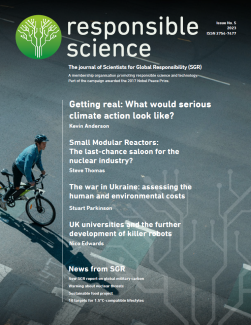Responsible Science is SGR’s journal in which we explore some of the biggest ethical challenges facing science and technology today. It comes with membership of SGR and keeps you up-to-date with what we’re doing as an independent, membership organisation made up of hundreds of natural scientists, social scientists, engineers and people who are simply interested. Contents include in-depth feature articles, reviews, and news on SGR's activities.
May 2023
To order a printed copy, please contact us - or you can download the pdf.
In issue no.5...
Feature articles
- Getting real: what would serious climate action look like?
Prof Kevin Anderson, Manchester University, summarises the action necessary if governments and societies were really committed to keeping global temperature change close to 1.5°C – and how there would be wider benefits too. - The great hybrid hoax
Anna Jonsson and Gunnar Lind, New Weather Sweden, explain how the auto industry exaggerated the environmental benefits of hybrid cars – and how this was challenged. - Lessons from lockdown: how a ‘discontinuity event’ opens possibilities
Andrew Simms, SGR, assesses the research so far on behavioural change during the COVID-19 pandemic, and considers the implications for tackling the climate and nature emergencies. - Small Modular Reactors: the last-chance saloon for the nuclear industry?
Prof Steve Thomas, Greenwich University, critically assesses the current enthusiasm for Small Modular Reactors in the UK and elsewhere. Will they help in the struggle against climate change, or will they sound the death knell for nuclear fission in the power sector? - The war in Ukraine: assessing the human and environmental costs
In February, 2022, Vladimir Putin ordered Russian forces to invade Ukraine. Dr Stuart Parkinson, SGR, assesses the data on the impacts of the war during the course of the year – both on the battlefield and beyond it – and considers what the future might hold. - UK universities and the further development of killer robots
A new report has uncovered the “disturbingly close” relationship between the military industrial sector and UK higher education, especially in areas related to Autonomous Weapons Systems. Nico Edwards, Sussex University, summarises the findings. - How big are global military carbon emissions?
Dr Stuart Parkinson, SGR, summarises the latest research on what is – and isn’t – known about the size of global military carbon emissions. - Nuclear power in Ukraine: what would happen if Zaporizhzhia was hit?
The Zaporizhzhia region in south eastern Ukraine houses the largest nuclear power station in Europe. It is currently in an intensely fought war zone. Dr Philip Webber, SGR, explains some of the risks of radiation releases that this poses, both nationally and internationally. - Offsets get the red card
The idea that people can continue polluting if they just pay into carbon offsetting schemes always seemed too good to be true. SGR’s Andrew Simms and New Weather Institute’s Freddie Daley spell out six reasons why it is. - Is your lifestyle helping or hindering system change?
Dr Stuart Parkinson and Dr Emily Heath, SGR, outline the role of behaviour change in tackling climate change – including SGR’s new ‘10 targets for 1.5°C-compatible living’.
News from SGR
- Editorial
- New SGR report on global military carbon
- SGR presents evidence to parliamentary committee
- Warning about nuclear threats
- Militarisation of science and technology
- Encouraging science bodies and other non-profits to take more climate action
- 10 targets for 1.5°C-compatible lifestyles
- SGR’s environmental action plan now accredited
- Other climate change activities
- Sustainable food project
- SGR in the media
- SGR is now a limited company
- SGR staff changes
Event review
- SGR's 30th anniversary conference
Science superpower or techno dead-end: what would a globally responsible Britain look like?
Book reviews
- The Evolving Landscape of Ethical Digital Technology - by Simon Rogerson
Review by Philip Inglesant - Hothouse Earth – An Inhabitant’s Guide - by Bill McGuire
Review by Andrew Simms
